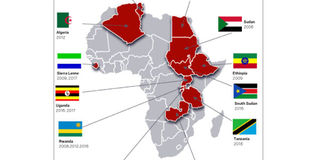Uganda among countries with draconian laws against NGOs

Countries which have Adopted Anti-NGO measures
Uganda has been listed among 12 African states that have in the last one and a half decades been adopting laws aimed at constraining the operations of Non-Governmental Organisations (NGOs) as part of what is described as a broader strategy by African governments to narrow space for democratic activity.
Uganda is listed along with the East African member States of Rwanda, Burundi, Tanzania and South Sudan. The others are Sudan, Ethiopia, Zambia, Tunisia, Algeria, Sierra Leone and Egypt.
By narrowing space for democratic activity, the countries are suffering reversals in the gains that they had made during the 1990s.
These are the findings of a report titled “Freedoms Under Threat: The Spread of Anti-NGO Measures in Africa,” which was released on Tuesday by Freedom House, a Washington-based watchdog organization whose operations are aimed at growing freedom and democracy the world over.
Freedom House mostly carries out research and analysis on the levels of freedom and democracy globally, amplifies the plight of those under the rule of repressive or authoritarian leaders with a view to prompt the government of the United States and other democracies to oppose dictatorship and oppression.
The coordinator of the Citizens Coalition for Electoral Democracy in Uganda (CCEDU), Mr Crispy Kaheru, welcomed the report as an appropriate description of what has been going on in Uganda.
Col Shaban Bantariza, the deputy executive director of the government-owned Uganda Media Centre, was, however, quick to dismiss the report.
“Different people in different parts of the world define democracy and rights differently. We all define those using different parameters, but there are those who think we should all be going by their parameters. We are not narrowing the space for democratic activity,” he said
According to the report, the product of a survey carried out in 20 African countries, the aim of the laws is to control the NGOs in various ways, including “limiting the flow of foreign funding, placing limits on hiring of foreigners, making it difficult to register organisations, and permitting governmental meddling in the sector while erecting obstacles in the operational environment”.
Another six countries: Rwanda, Zambia, Sudan, Malawi, Egypt, and Mozambique have also lined up laws to have the same effect.
“The aim is to not only starve the sector of resources, but also establish more effective government controls, even to the point of essentially taking over the sector,” the report reads in part.
The legal framework, according to the report, have always entailed a combination of four categories of measures, notably making registration requirements that are subject to broad bureaucratic discretion; limiting, capping or excluding foreign funding and hiring of expatriates; permitting improper interference in the operations of the NGOs; and exclusion of NGOs from activities that are deemed political.
The mandatory registration requirements, the report says, amounts to a violation of freedom of association.
The Non-Governmental Organisations Act 2016 hands the Minister of Internal Affairs and the National Board for Non-Governmental Organisations broad powers to supervise, approve, inspect, and dissolve all non-governmental organisations and community-based organisations. It also imposes severe penalties for violations. It subjects violators to fines and up to eight years in prison, depending on the offence committed.
On September 20, 2017, at the height of protests against plans by the ruling NRM party to repeal Article 102(b) of the Constitution that puts a cap of 75 years on presidential candidates, the government invoked that law and sanctioned police raids on the offices of ActionAid Uganda and Great Lakes Initiative for Strategic Studies (Gliss). The police confiscated property, including computers amid accusations that the NGO were engaging in acts of money laundering.
On October 6, Bank of Uganda, working on the orders of the Ministry of Internal Affairs, froze the two organisations’ accounts. The accounts of ActionAid were unfrozen two months later, but not those of Gliss.
Used as conduits?
“Some of those NGOs come saying they are going to do charity, but end up as conduits for negative engagements. If you engage in political projects and intelligence finds you out, you can expect political hazards,” Col Bantariza said in defence of the raids and freezing of the accounts.
Now the Freedom House report is alluding to those moves and the imposition of several layers of mandatory registration at national level within one or multiple government ministries and in the localities where the NGOs operate.
“…In the case of Uganda, foreign NGOs register with the National NGO Bureau, but they also require letters from the embassy of their home country in Kampala and from the Ugandan Ministry of Foreign Affairs, as well as “recommendations” from the relevant line or sectoral ministry in Uganda and the NGO Monitoring Committee in the district or county of operation, which can reject an application. All these operate as additional filters with real power to determine the outcome of an application,” the report further reads.
Col Bantariza, however, insists that there was need to have the NGOs regulated, adding that the laws can always be revisited if they are deemed unfair.




